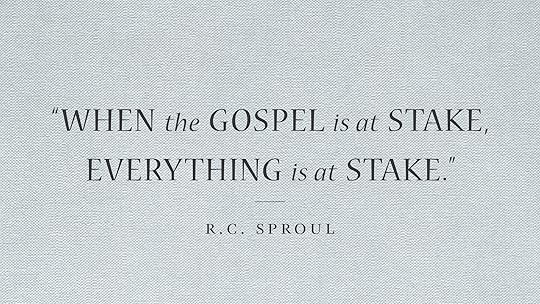R.C. Sproul's Blog, page 59
September 10, 2020
When the Gospel Is at Stake, Everything Is at Stake

Christians have hope because Christ’s righteousness has been imputed to them, but where will our unsaved friends turn? To the world and its standards of righteousness? Or to God’s standard? And who will tell them?
This month, we’re eager to send you a special gift when you support Ligonier with a gift of any amount: the twenty-fifth-anniversary edition of Faith Alone by Dr. R.C. Sproul. This book can assist you in holding fast to the true gospel and fighting back the influence of the legalism pervading our culture.
Today, it seems our acceptance in society depends on our measuring up to an ever-moving standard. One misstep and all is lost. An intolerance for truth results in people being silenced for stating inconvenient facts. Historical figures are dismissed altogether for their failing to perfectly live up to the creed they professed. The family structure is attacked for being too exclusive, too biblical.
Make no mistake: this is nothing less than the bondage of cultural legalism that holds so many people, past and present, to impossible standards and provides no means to atone for the failure to meet them. Legalism is no gospel. It offers only condemnation.
And as Dr. Sproul frequently observed, the problem with legalism isn’t just out there in the culture—it’s here in the church, among the people of God. It lurks in my sinful heart and yours. As goes the church, so goes the culture.
There is also a legalism in the church that confuses the gospel, adding unbiblical burdens where God has made His people free. This kind of legalism can stunt spiritual growth and reduce the Christian life to mere externals rather than living before God in dependence on Christ’s grace and seeking true holiness in heart and life. It’s a legalism that binds consciences, requiring adherence to rules not mandated by Scripture.
As I have learned from R.C. and the Teaching Fellows at Ligonier, there is only one answer to overbearing legalism—the pure, clear, simple gospel.
For anyone who trusts solely in Christ’s sinless life and sacrificial, substitutionary death on the cross, there is no condemnation (John 6:47; Rom. 6:23; 8:1–4). Your hope and mine are found only in the righteousness of Christ imputed to our account.
Carrying on R.C.’s legacy, Ligonier Ministries puts the gospel of God at the center of everything we do. We’re striving to maintain R.C.’s laser-like focus on preaching the gospel of grace and for standing for the essential truths of the gospel when others want to compromise. He understood that if we fail to get the gospel right, we have no hope in this world or in the world to come.
Standing for the gospel is never easy and always invites opposition. Paul and many other Apostles were beaten and executed for their gospel testimony. The Lord Jesus Himself, the first preacher of the gospel and the One whose person and work are the subject of the gospel, was killed for proclaiming it.
So it has been with Christians throughout history. The freedom proclaimed in the gospel turned the ancient world upside down (Acts 17:6). Great Christian leaders such as Athanasius and Martin Luther faced exile and the threat of death for holding fast to core gospel truths. Closer to home, R.C. lost friendships and support when he contended for the gospel truth that we are justified by faith alone.
These men and others suffered for the gospel because its message of salvation is truly worth suffering for. Fallen humanity is always trying to save itself, but only the gospel can give us peace with God (Rom. 5:1). The only solution to the legalism and unrest we’re seeing in the church and in the culture is found in the gospel of Jesus Christ.
Tragically, however, many churches and preachers focus on everything but the gospel. In reality, the biblical gospel is very simple—consisting of the truths about the life, death, resurrection, and ascension of Christ and the means by which we receive the benefits of Christ and His work: through faith in Him alone. But we so easily allow lesser matters to distract us from the simple, unvarnished gospel.
By your generosity, you work with Ligonier around the world to help believers know and remain committed to the gospel. This international effort has grown expansively in recent months as the need for clear biblical teaching is more dire. Discipleship in the truth matters because all people matter.
As I mentioned above, when you support Ligonier this month, we will gladly send you the twenty-fifth-anniversary edition of Dr. Sproul’s book Faith Alone. I think this ranks among his most important works, as it lays out in plain language what is at stake in the debates over the gospel, considers the work of Christ, and explains why we must insist that we are justified by faith alone.
Your gift will go far in taking the good news of Jesus to the ends of the earth. As R.C. has said, “When the gospel is at stake, everything is at stake.”
Thank you for your support in the fight against legalism’s enslaving influence and the defense of God’s saving grace in Christ.


September 9, 2020
New Book: A Field Guide on False Teaching

How do you know if someone is telling the truth about God? And how should you respond if they are not?
Every Christian is responsible for knowing God’s Word and sharing it with others. But in a world affected by sin, false teaching is everywhere. Many people obscure, distort, or challenge what God has revealed in Scripture—even some leaders in the church. To be better prepared as witnesses for Christ, we must identify falsehood and the devastating harm it brings.
The latest book from Ligonier Ministries, A Field Guide on False Teaching, surveys prominent theological errors, cults, and world religions, equipping you to defend your faith against the dangers of false doctrine. By God’s grace, this resource can also help you more effectively respond to your friends, family, and neighbors with the hope you have in Christ.
“Just as the church during the Apostolic age was buffeted by various false teachings, the church today continues to be threatened by a number of false doctrines. Prosperity gospels, the rejection of God’s sovereignty and providence, denials of the deity of Christ, legalistic teaching on justification and sanctification, and antinomianism (i.e., lawlessness) are some of the false teachings that have taken root in various churches today. Ministers and congregants alike must stand against these forms of false teaching whenever and wherever they surface.” —Excerpt from the book
Available now in the Ligonier store.
Paperback for $15.00 $12.00


September 8, 2020
The State of Theology Survey: 2020 Results

What do Americans think about Jesus Christ, the Bible, truth, and ethics? Ligonier Ministries’ State of Theology provides insights. Every two years, we take the theological temperature of the United States to help Christians better understand today’s culture and equip the church with better insights for discipleship.
As in previous years, we commissioned a survey of three thousand Americans in partnership with Lifeway Research. Today, we are pleased to release the results from our 2020 survey.
Our president and CEO, Chris Larson, had this to say about the State of Theology survey results:
“This survey shows that people inside the church need clear Bible teaching just as much as those outside the church. Dr. Sproul understood this well. In addition to serving the church and informing other ministries, these results continue to reveal the importance of our mission at Ligonier Ministries as a teaching and discipleship ministry. As trends in the data suggest, the necessity of this work has grown only more urgent since R.C. founded the ministry nearly fifty years ago. With biblical illiteracy and doctrinal error on the rise, we remain committed to contending for the faith once delivered to the saints.”
Whether it’s the 30% of evangelicals who apparently reject the deity of Christ, the 46% who believe that people are good by nature, or the 22% who think that gender identity is a matter of personal choice, you can find all of the eye-opening survey results at TheStateOfTheology.com. Please explore the website and use the data any way you would like. We hope the findings from this survey will serve the church in its calling to reach more people with the faithful proclamation of God’s Word.
In addition, this year you can take the survey yourself or create a private group survey for a group of friends or members of your church. We encourage you to use the State of Theology survey to help you facilitate discussion and better understand the beliefs of people in your community.
Explore the findings of our 2020 survey today.
For analysis of the data from LifeWay Research, please see their official white paper or download the entire survey with key findings.


What Is Time?
Here’s an excerpt from What Is Time?, Thomas Brewer's contribution to the September issue of Tabletalk:
”What time is it?” Sometimes I’m asked that question by a complete stranger. It’s an easy question to answer. I just check my phone or watch, and I state the time. But no stranger has ever asked me, “What is time itself?” That’s a much more complex question to answer. On the one hand, we know what time is, because we use it every day. We start our day with an alarm buzzing, we check the clock throughout the day to be sure we’re on schedule, and we go to bed hoping we get several hours of sleep. We also know that time has a cumulative effect. Children grow up and become adults. Relationships change. Seasons pass.
Continue reading What Is Time?, or begin receiving Tabletalk magazine by signing up for a free 3-month trial.
For a limited time, the new TabletalkMagazine.com allows everyone to browse and read the growing library of back issues, including this month’s issue.


September 7, 2020
Do the Work of an Evangelist

In his final letter, Paul charges Timothy, his son in the faith, to “do the work of an evangelist” (2 Tim. 4:5). By these words, the aged Apostle establishes the timeless standard for pastoral ministry, not only for young Timothy but for all pastors in every generation and in every place.
With Apostolic authority, this imperative command comes with binding force. All pastors must do the work of an evangelist. They must earnestly proclaim the gospel message, urging people to trust in Jesus Christ alone for salvation. So, where should this pastoral evangelism begin?
First, every pastor must preach the gospel to himself. Before any pastor can call others to repent, he must believe in Jesus Christ. The Apostle Paul exhorts Timothy, saying, “Pay close attention to yourself and to your teaching; persevere in these things, for as you do this you will ensure salvation both for yourself and for those who hear you” (1 Tim. 4:16). That is, every preacher must examine his own soul first. The success of one’s evangelism is, first and foremost, dependent upon his right standing in grace.
In The Reformed Pastor, Puritan Richard Baxter addressed the ministers of his day, many of whom were unconverted: “See that the work of saving grace be thoroughly wrought in your own souls. Take heed to yourselves, lest you be void of that saving grace of God which you offer to others.” Simply put, pastors must embrace the very message they preach.
Charles Spurgeon writes:
A graceless pastor is a blind man elected to a professorship of optics, philosophizing upon light and vision, discoursing upon … the nice shades and delicate blendings of the prismatic colours, while he himself is absolutely in the dark! He is a dumb man elevated to the chair of music; a deaf man fluent upon symphonies and harmonies! He is a mole professing to educate eaglets
Sadly, unconverted pastors do exist. Martin Luther was a doctor of theology and professor of Bible before he was born again. John Wesley was an overseas missionary prior to his conversion. Every pastor must be certain of his own salvation before he can powerfully preach the gospel to others.
Second, every pastor must preach the gospel to his family. Evangelism in the home begins with shepherding one’s own wife in her relationship with Christ. I will never forget an elder’s meeting in which one of our pastors shared that his wife had been converted the previous night. She was one of the nicest people in the church, yet, unknown to us, she was unconverted. How often is this the reality? To this end, every pastor must give attention to the spiritual state of his wife.
Similarly, he must give the same attention to his children. This evangelism should begin early and involve disciplines such as Bible readings, catechizing, and family devotions. I came to faith in Christ as a result of my father reading the Bible to me in the evenings. Moreover, home evangelism should include informal conversations, probing questions, and a consistently godly life modeled before the children.
Third, every pastor must preach the gospel to his flock. There must be a sober realization that not every church member is regenerate. Every pastor’s evangelistic work must center in his pulpit ministry as he regularly presents the gospel with clear, decisive appeals. He must implore his congregation to respond to the gospel and be saved. There should be a distinct urgency in his voice as he exhorts, even pleads, for his flock to be converted.
Certainly, this evangelistic thrust is not to be confused with abuses and manipulative methods. I am not contending that people raise a hand, walk an aisle, parrot a prayer, and be declared saved—all within five minutes. But I am insisting that our gospel preaching must be compelling. It must come with bold proclamations of the cross, warm appeals to come to Christ, and passionate persuasions that urge people to respond by faith alone. Pastors must give gospel messages that call for repentance and issue severe warnings of eternal consequences for unbelief.
Fourth, every pastor should evangelize the community. The strategies will differ from one man to the next, depending upon his gifts and opportunities. As a fisher of men, he must go where the fish are. He must leave dry land, sail out into deep waters, and cast his net. Pastors must venture out into the community, share the gospel, and urge people to believe upon Christ. Community outreach involves building bridges to unbelievers. This may include hosting a Bible study in an office, a restaurant, or a home. It can involve a local radio program, a newspaper editorial, or an Internet blog. It means showing acts of mercy with a gospel presentation. Whatever the strategy, making such inroads requires going where unconverted people are and unashamedly sharing Christ.
It has been rightly said that the greatest joy is knowing Christ and the second greatest is making Him known. May every pastor enter joyfully into this privileged task of doing the work of an evangelist.
This post was originally published in Tabletalk magazine.


September 5, 2020
A Reformed Church

What do Christians need in order to survive a radically secular age? From his series A Survey of Church History, W. Robert Godfrey encourages us to embrace the biblical realism of Reformed church life.
Transcript:
Calvinists are realists. That does not mean we are never optimistic, but we are not always optimistic. A Calvinistic church is a place you can grieve, a place where you can be sad as well as happy, where there is a realism in the approach to life. So, a Reformed church is, I believe, what we are going to need progressively, because I think it's not too much to say that we seem in the midst of a third American Revolution. When we talked about the 19th century, I talked about how the first American Revolution was really a revolution of patricians to maintain their rights as Englishmen. Then, in the 1820s, we really had a second American Revolution, where a more democratic spirit - you remember I quoted the historian who said we had moved from ruled by the snobs to ruled by the mobs. I think we are seeing now what may turn out to be a third American Revolution, which will be radical and secular in its individualism.


September 4, 2020
Is There a Role for Entertainment in the Church?

Should we seek to make our worship entertaining? From one of our Ask Ligonier events, Derek Thomas directs us toward the proper place of fun and amusement in the Christian life.
When you have biblical and theological questions, just ask Ligonier.


Jesus, Our Substitute

The word vicarious is extremely important to our understanding of the atonement of Christ. The late Swiss theologian Karl Barth once said that, in his judgment, the single most important word in all of the Greek New Testament is the minuscule word huper. This little word is translated by the English phrase “in behalf of.” Barth was clearly engaging in a bit of hyperbole in making this statement, because many words in the New Testament are arguably as important or even more important than huper, but he was simply seeking to call attention to the importance of what is known in theology as the vicarious aspect of the ministry of Jesus.
He made satisfaction for our debt, our enmity with God, and our guilt. He satisfied the ransom demand for our release from captivity to sin. However, there is another significant word that is often used in descriptions of the atonement: substitution. When we look at the biblical depiction of sin as a crime, we see that Jesus acts as the Substitute, taking our place at the bar of God’s justice. For this reason, we sometimes speak of Jesus’ work on the cross as the substitutionary atonement of Christ, which means that when He offered an atonement, it was not to satisfy God’s justice for His own sins, but for the sins of others. He stepped into the role of the Substitute, representing His people. He didn’t lay down His life for Himself; He laid it down for His sheep. He is our ultimate Substitute.
The idea of being the Substitute in offering an atonement to satisfy the demands of God’s law for others was something Christ understood as His mission from the moment He entered this world and took upon Himself a human nature. He came from heaven as the gift of the Father for the express purpose of working out redemption as our Substitute, doing for us what we could not possibly do for ourselves. We see this at the very beginning of Jesus’ ministry, when He initiated His public work by coming to the Jordan River and meeting John the Baptist.
Imagine the scene at the Jordan that day. John was busy baptizing the people in preparation for the coming of the kingdom. Suddenly he looked up and saw Jesus approaching. He spoke the words that later became the lyrics for that great hymn of the church, the Agnus Dei: “‘Behold! The Lamb of God who takes away the sin of the world!’” (John 1:29b). He announced that Jesus was the One Who had come to bear the sin of His people. In His person, He would fulfill all of what was symbolized in the Old Testament sacrificial system, by which a lamb was slaughtered and burned on the altar as an offering before God to represent atonement for sin. The lamb was a substitute, so in calling Jesus “the Lamb of God,” John was asserting that He, too, would be a Substitute, but One Who would make real atonement.
Jesus came to John and, to John’s horror, asked to be baptized. Scripture gives us John’s reaction to this request. “John tried to prevent Him, saying, ‘I need to be baptized by You, and are You coming to me?’” (Matt. 3:13). That simple statement must have masked a deep confusion on John’s part. He had just announced that Jesus was the Lamb of God, and in order to serve as the perfect sacrifice to atone for the sins of His people, the Lamb of God had to be without blemish. He had to be completely sinless. But the ritual of baptism that John was calling all of Israel to undergo in preparation for the coming of the Messiah was a rite that symbolized cleansing from sin. So John said, in essence, “It would be absurd for me to baptize You, because You are the sinless Lamb of God.” John then put forth an alternative idea: Jesus should baptize him. This was John’s way of acknowledging that he was a sinner who needed cleansing.
Jesus overrode John’s protest. “Jesus answered and said to him, ‘Permit it to be so now, for thus it is fitting for us to fulfill all righteousness’” (Matt. 3:15a). Jesus’ choice of words in this statement is interesting. First He said, “Permit it to be so now.” The fact that Jesus gave His command to John in these particular words shows that He understood there was some theological difficulty involved. It was as if Jesus was saying, “John, I know you don’t understand what’s happening here, but you can trust Me. Go ahead and baptize Me.”
However, Jesus went on to give an explanation as to why John should baptize Him. He said, “It is fitting for us to fulfill all righteousness.” The word fitting here can also be translated as “necessary.” In other words, Jesus said it was necessary for Him to be baptized. How was it necessary? John the Baptist had come as a prophet from God. Jesus would say later, “Among those born of women there is not a greater prophet than John the Baptist” (Luke 7:28a). Through this prophet, God had given His covenant people a new command: they were to be baptized. We should never think that God stopped expressing His will to His people after He spoke the Tenth Commandment. A multitude of laws was added to the basic Ten Commandments after they were given. The command that His people undergo this cleansing rite to prepare for the breakthrough of the divine kingdom was merely the latest edict from God.
Before He could go to the cross, before He could fulfill the role of the Lamb of God, before He could make Himself an oblation to satisfy the demands of God’s justice, Jesus had to submit Himself to every detail of every law God had given to the nation. He had to represent His people before the bar of God’s justice in every detail. Since the law now required that all of the people be baptized, Jesus, too, had to be baptized. He had to fulfill every single commandment of God if He was to be sinless. He wasn’t asking John to baptize Him because He needed to be cleansed; He wanted to be baptized so that He could be obedient to His Father in every detail.
That’s the point Jesus was making here to John, because Jesus’ mission was to be the Substitute, the vicarious sacrifice offered to God. Jesus understood this and embraced it. From the start of His ministry, He knew He had come to act as a Substitute on behalf of His sheep. At the center of His teaching was the assertion that He was doing this not for Himself but for us—to redeem us, to ransom us, to save us.
This excerpt is adapted from The Truth of the Cross by R.C. Sproul.


September 3, 2020
$5 Friday (And More): Prayer, Salvation, & Worship

It’s time for our weekly $5 Friday sale. This week’s resources include such topics as prayer, the Psalms, salvation, worship, Christian worldview, and Scripture.
Plus, several bonus resources are also available for more than $5. These have been significantly discounted from their original price. This week’s bonus resources include:
Hymns by Michael Card, CD $16 $10
Holiness of God Extended Version with R.C. Sproul, CD $38 $9
City of Man with R.C. Sproul, CD $17 $8
The God We Worship with R.C. Sproul, DVD $30 $15
Exploring Islam with James Anderson, DVD $48 $15
Learning to Love the Psalms with W. Robert Godfrey, CD $31 $12
Learning to Love the Psalms with W. Robert Godfrey, Study Guide $15 $5
Awakening: 2018 National Conference , DVD $75 $18
The Sermon on the Mount by Sinclair Ferguson, Paperback $10 $7
Just Do Something by Kevin DeYoung, Paperback $12 $8
Ashamed of the Gospel: When the Church Becomes Like the World by John MacArthur, Paperback $20 $13
Defending Your Faith by R.C. Sproul, Paperback $17 $10
Striving Against Satan by Joel Beeke, Paperback (Spanish) $11 $7
What Is the Christian Worldview? by Philip Ryken, Paperback (Spanish) $5 $3.25
Can I Trust the Bible? by R.C. Sproul, Paperback $2 $1
Maturity: November 2016 Tabletalk , Magazine $3 $1
The Theology of Evangelism: June 2012 Tabletalk , Magazine $3 $1
Key Questions About Prayer: March 2019 Tabletalk , Magazine $3 $1
Sale runs through 12:01 a.m.–11:59 p.m. Friday ET.
View today’s $5 Friday sale items.


A Conversation on Faithful Christian Living: September 3, 2020

Recently, our president and CEO, Chris Larson, hosted a panel discussion with three of Ligonier’s Teaching Fellows: Drs. W. Robert Godfrey, Stephen Nichols, and Burk Parsons. On September 3, we streamed this conversation about the challenges of living faithfully as Christians in a hostile culture.
This special event was streamed on Ligonier’s blog, YouTube, Facebook, and Twitter. You can also watch a recording of the discussion below.
R.C. Sproul's Blog
- R.C. Sproul's profile
- 1931 followers





